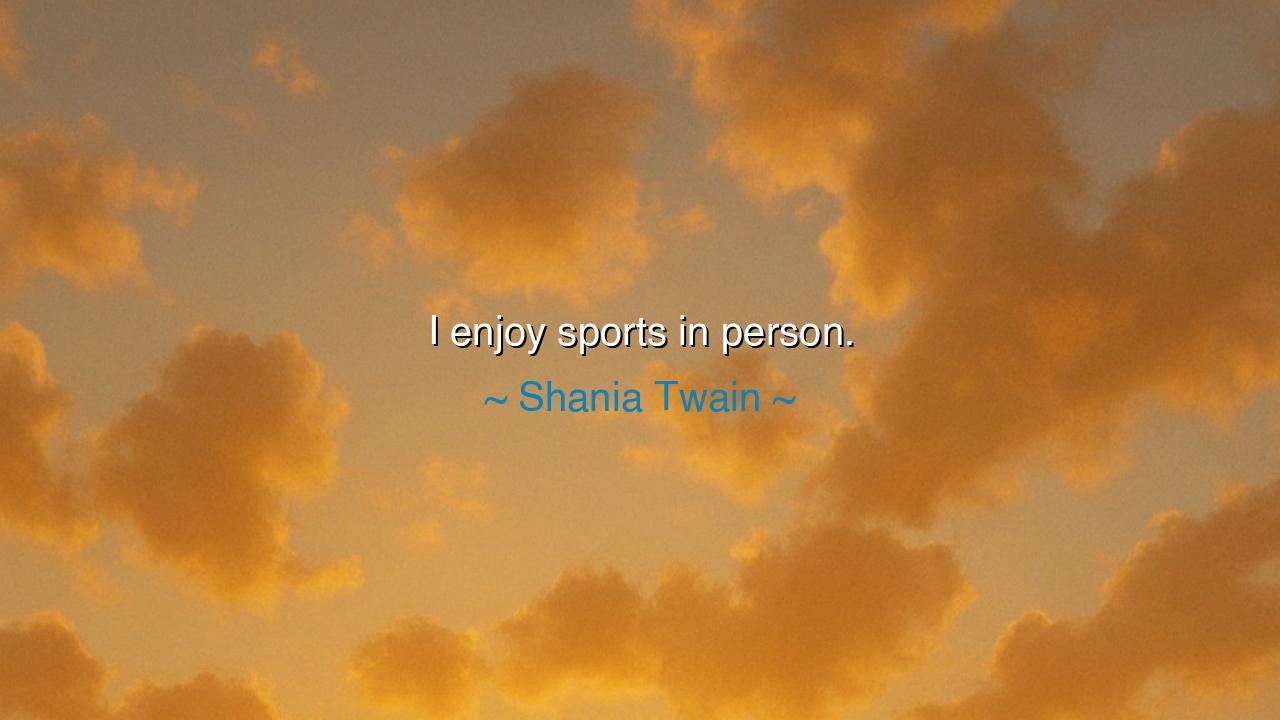
I enjoy sports in person.






Shania Twain’s words, “I enjoy sports in person,” may appear simple, yet within them lies a profound truth about presence, experience, and the spirit of human connection. In an age where the world is mediated by screens, where distance often replaces closeness, her declaration is a return to the ancient wisdom that the body must be where the heart longs to be. To behold the contest not through shadow and reflection, but with one’s own eyes, amidst the roar of the crowd and the breath of the players, is to touch life in its rawest form.
For sports are not only about scores and outcomes, but about the energy that arises when people gather, hearts beating in rhythm with the clash before them. The echo of footsteps upon the field, the cry of triumph, the groan of defeat—these are not fully captured in distant transmission. The in person experience binds the soul to the moment; it makes the heart leap, the skin tremble, the memory endure. To watch alone through a window of glass is to see the fire, but to stand near the flame is to feel its warmth and to carry it within.
History gives us vivid examples. When the ancient Greeks gathered in Olympia to witness the games, they did not do so from afar. They traveled, they assembled, they endured the sun and the dust, because to be present was to join in the glory of their people. To watch the runner sprint, the wrestler grapple, the discus soar—it was more than observation; it was communion. They felt themselves participants, bound to the fate of their champions. The victory of one became the victory of all, because all had witnessed it together beneath the open sky.
Even in modern times, the same truth endures. Think of the 1999 FIFA Women’s World Cup Final, when Brandi Chastain’s decisive penalty kick sent waves of exultation through the stadium. Those who were present felt the earth shake with the force of history being made. Those who saw it only later, upon a screen, knew the fact of victory but not the spirit of it. For the spirit is not data; it is shared breath, the pulse of thousands united in one heartbeat. That is what it means to enjoy sports in person.
The deeper meaning of Twain’s words is that life itself is to be lived in person. Just as the contest of athletes is best experienced with presence, so too are our own struggles, joys, and relationships. To live at a distance, to substitute shadows for substance, is to rob ourselves of the fullness of being. Presence is not mere attendance; it is devotion, a giving of oneself to the moment, so that nothing remains half-felt or half-seen.
This truth also carries warning: the more we let technology mediate every experience, the further we drift from the sacred immediacy of the human spirit. A recorded cheer cannot shake the bones. A replay cannot carry the scent of sweat and grass. A highlight reel cannot replicate the trembling of the soul when the outcome is yet unknown. Only presence grants these things, and presence is the treasure we must protect.
Therefore, let this be the lesson: whatever your field—whether sport, art, or love—be there, wholly and completely. Seek not always the safety of distance but the risk of presence. Place yourself in the moment, feel its uncertainty, breathe its air, let its sounds and silences mark your heart. To enjoy sports in person is not only about games; it is about how we ought to live our lives: awake, engaged, and unafraid of being part of the story as it unfolds.
And so, Shania Twain’s simple truth becomes ancient wisdom: life is not meant to be observed from afar. It is meant to be entered, embraced, endured, and celebrated. Go, then, not as a watcher of shadows, but as one who stands in the light, where the roar of the crowd and the thunder of the moment will teach you what it means to truly be alive.






AAdministratorAdministrator
Welcome, honored guests. Please leave a comment, we will respond soon